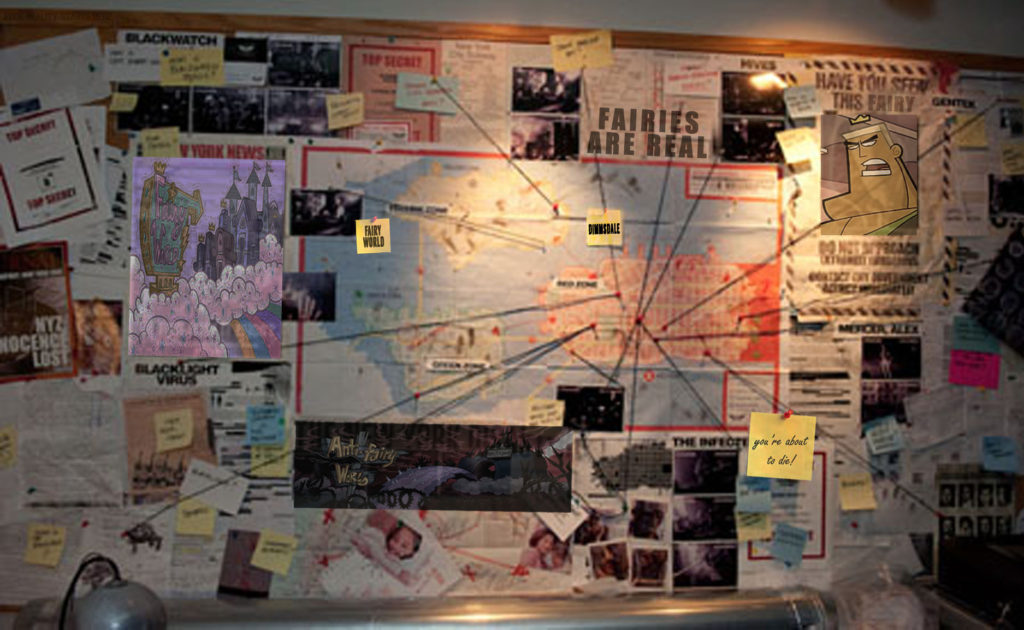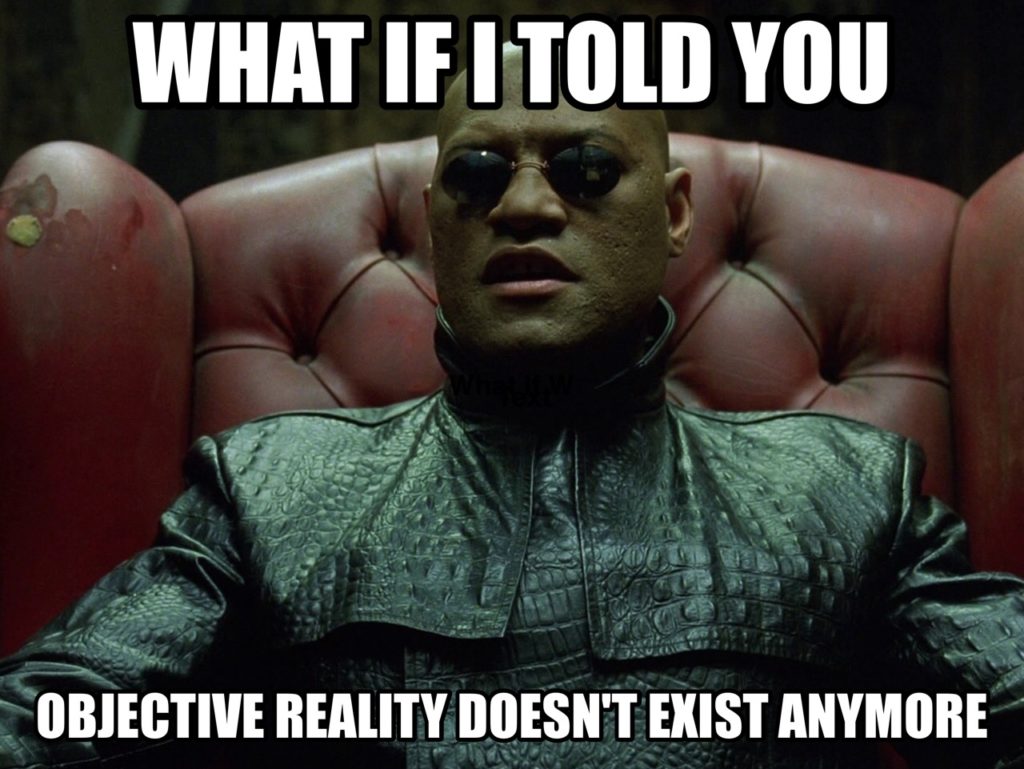Part I – The Diagnosis
For a man of my age (36), perhaps no piece of pop culture spoke to my still-forming personal identity than the 1999 film The Matrix. There are several cultural memes that my generation draws from this film’s enlightening philosophy to this day. First, the metaphor of “waking up” from a sedated conformity could be applied to almost any rudimentary societal norm from a working a boring job to the banality of tradition like church or marriage. Second, the image of Morpheus holding the blue and red pills I think speaks to us all when contemplating ideas of free will, fate, or encountering our most consequential crossroad moments. Third, and most relevant to this essay, is the concept that nothing about your reality is real. This line from Morpheus explaining The Matrix to Neo is something I think about constantly.
“What is real? How do you define ‘real’? If you’re talking about what you can feel, what you can smell, what you can taste, and see, then ‘real’ is simply electrical signals interpreted by your brain.”
I think about this sentiment with a perplexed state of humility and confusion in light of recent events. Seriously, what is real?
I try to vet my sources in news gathering and fact finding. If I’m unsure about a fact, I check multiple, reputable or what I believe to be be reputable sources for verification. If I’m debating someone, I’ll link them to NPR, or BBC, NY Times, ABC News, backing up my claim. Organizations with newsrooms, fact checkers, experienced editorial staffs, and journalistic standards. But no one trusts the “Mainstream Media” anymore. A few weeks back, someone linked to an Anonymous YouTube video to prove me wrong, and it was then I knew…facts don’t matter anymore.
We don’t trust scientists. We don’t trust academics. We don’t trust the “experts”. We don’t trust journalists. Who do you trust when you don’t trust anyone? Perhaps someone who makes you feel good.
Donald Trump’s recent election win is quite remarkable in that he played fast and loose with the truth his entire campaign. Despite the admonishment of his opponents’ honesty wth denouncements like “Lyin” Ted and “Crooked” Hilary, it was he that was rated by far the biggest liar in the Presidential campaign. According to Politifact.com, 70% of his statements are mostly false or flat-out lies. The NY Times assembled a chart of Presidential candidates’ honesty, and only Ben Carson fared worse.
The problem is that even me using references like the NY Times and Politifact.com or FactCheck.org, is that many people don’t trust them. I come off like some liberal hack feeding off the propagandistic teat of my lefty overlords. Of course I’d believe the NY Times, they are rooting for Hilary and are funded by George Soros to enact the New World Order of the globalists to do…I’m not so sure what, but it’s very dystopian, Orwellian, and frightening.
Today, I find myself in debate after debate on social media arguing over “fake news”, whether climate change is real, if the Russians really hacked us, questioning whether this news organization or that news organization is accurate – it leaves my fucking head spinning. I am extremely concerned and aggravated to live in an environment where different sides of the political coin each have their own set of facts. I don’t really care who is right. When it comes to facts, there should only be ONE TRUTH: what, where, when, how, why. That’s it. I don’t want spin, I don’t want someone’s opinion. Just the elemental components of truth.
This clip featuring Newt Gingrich on how many people filter the idea of truth in modern times is especially troubling, because I think it’s emblematic of how serious the problem is. Feelings matter more than facts.
The main problem is that Americans are losing faith in their institutions. In a recent FiveThirtyEight Politics podcast, they researched Gallup polling on institutional faith, and found that faith in most American institutions “cratered in 2007” surrounding the aftermath of the market crash. According to Gallup, in 2006, 49% of Americans had a great deal or quite a lot of confidence in banks, and today that number is 27%. In 1979, 51% of Americans had trust in newspapers, today that number is down to 20%. Those Americans with a great deal or quite a lot of confidence in organized religion has fallen from 68% in 1975 to 42% in 2015.
Unfortunately, I may come off as partisan for this next argument, but it’s difficult to deny that since the Reagan era, conservatives having been pushing the idea that government is bad, or as he said it, “Government is the problem.” That line of argument is actually very effective in winning elections with Republicans winning the Presidency 5 out 7 times between 1980-2004. The problem is that like the theme of the film Inception, planting the seed of an idea can have dramatic and detrimental effects down the road. While I believe keeping bloated and overreaching governments in check is very important, being inundated with the idea that government is inherently bad has grown into a rampant mistrust and even resentment of the very idea of government itself, regardless how representative or democratic our system may be.
There is some evidence according to the research of Yascha Mounk, a lecturer on government at Harvard, and Roberto Stefan Foa, a political scientist at The University of Melbourne, that the US faith in democracy itself may be in serious danger, especially among young people. In a NY Times articles featured this week entitled, How Stable Are Democracies?’Warning Signs Are Flashing Red’, they posit that the US and many other countries in the West have a younger population that doesn’t regard democracy as essential, and is more open to military rule, and mirror similar trends to countries that veered from liberal democracies in recent decades like Venezuela and Poland. This is still just a theory, but it is still alarming in my view.
The absence of trust, the lack of the need for evidence to prove claims has been gnawing at my brain for weeks. That word – evidence – is so important, because this is not a new thing. According to Pew Research, 84% of the world’s population is affiliated with a religion. And this number is down with secularism on the rise in the last 30 years, especially in the West. Throughout human civilization, most of us have believed in the afterlife, magic, ghosts, and all forms of supernatural manifestations without any evidence. Why should we expect reason and logic to overtake that which has been so natural for the human mind and emotion to connect to for millennia? With all due respect to those readers of faith, if you believe in the religious myth, then you believe in magic and superstition, in spite of whatever mental compartmentalization has to take place.
Part II – How We Got Here
Alexander Hamilton once said, ” If you don’t stand for something, you’ll fall for anything.” There should an updated version of that sentiment; if you don’t have faith in something tangible, you’ll fall for anything. While my statement isn’t nearly as poetic, and I am not a man of traditional faith, I do have faith in many concrete elements of my general reality. For example, I have faith in the idea that I am typing this on a computer in my room, that my wall is solid and will hurt my hand if I punch it, or that a compass will reliably tell which way north is if I use it to navigate.
This is brings me to the idea of conspiratorial thinking, which I assert has infected much of the global populous primarily through how the internet and social media has intersected and changed our lives and how we communicate. Conspiratorial thinking as a metaphorical infection manifests itself once you begin to believe every major pillar of power is a conspiracy. Government, business, the media, the military – all feature a small group of centralized, nefarious, all-powerful, wealthy, and distinctly evil people with a well organized plot that has to do with control. Controlling what? Everything, but mainly you and your interpersonal environment.

I know this because once upon a time, I had a serious flirtation with conspiracy. These ideas were attractive to me because I think it’s really important to question everything, especially the establishment and social and societal conventions. I was able to keep these ideas at arm’s length, but it’s a very slippery slope.
My entry point into politics was two-fold: the 2000 election where George Bush won (lost popular vote) under suspicious circumstances after a stifled recount in Florida, and 9/11. It is very easy to not have faith in a system that produces startling events like these within a year of each other, especially when you are young and impressionable. I think millions of others like me got sucked into this world with a 9/11 conspiracy documentary called Loose Change that claimed the September 11th 2001 attacks were an inside job.
I believed it. Over the years, I saw and read many expert accounts that disproved many of the assertions of the film, which made me take the 9/11 conspiracy theories with a grain of salt. Then, the filmmakers released a 2nd version of the film with updates removing previous things they had gotten wrong. I started to realize that these are just some regular guys doing this independently, they have nothing really to be accountable for. And that’s the thing with conspiracies, you don’t have to prove anything. You just have find a handful of compelling coincidences, and the human mind fills in the blanks. You want to believe it, because it’s always more exciting than the official story. That’s what’s crazy about 9/11; the official story is already one of the craziest stories ever, without the idea that it’s an inside job.
The next conspiracy-tinged documentary that captured my imagination was the Zeitgeist Trilogy. While I would count this film series as evolving into something vastly more credible than Loose Change, the original film did center around one theme pivoting off of three branches: 9/11 was an inside job, Christianity is a sham, and the economy is vast scheme. The point is that the fundamentals of your reality are a lie. Government, religion, and money are all a fiction and you’ve been “asleep”. The Matrix metaphor comes full circle.
The 2nd and 3rd Zeitgeist films steered away from conspiracy, focused on the flaws of capitalism, and became very solution oriented and positive. In a way, this film series changed the way I thought forever, cemented my non-conformist, anti-traditionalist sensibilities, and validated my instincts for compassion. Although, I believe the original film sent many others further down the conspiracy rabbit hole.
Around this time 2006-2008 I dipped a toe in that world checking out guys like Alex Jones and David Icke. I began watching a shitload of Ancient Aliens, any documentary about aliens chem trails, and just consuming any bit of conspiratorial fodder I could lap up. That’e the thing about aliens, the JFK assassination, lizard people, and faked moon landings is that it’s about as much fun an adult can have. Especially for for non-religious people like myself. Even when you don’t have a prefixed mystical destiny or an eternal, spiritual odyssey to have a place in, it still doesn’t shut off the part of being a human that wants to believe in something. Entertainment plus meaningfulness plus the idea that you are special, not like everyone else, all the sheep, is a potent mental cocktail. It is intoxicating to construct a fantastical narrative in your head where you are this rogue, maverick, almost secret agent who is against the all-powerful system, particularly for single, lonely men without much purpose. Just like Neo. You combine that with a global financial crisis in 2008 and Facebook becoming the biggest social media site in 2009, and you get the perfect storm to make conspiratorial thinking to go mainstream in only a few years.
In the Obama years, the conspiracy talk on the right just elevated. “Obama is a Kenyon. He’s a Muslim. He’s a gay, terrorist, Muslim, socialist, communist, Kenyon, Anti-Christ, who also hates America.” Perhaps you remember when Glenn Beck was getting the highest ratings on Fox News for a time literally doing a performance art, stream of consciousness conspiracy program, and people just ate it up.
Even Beck has come to regret what he did, and even sought help for his mental health issues.
I evolved past most of the conspiracy stuff, and just took it with a grain salt. I realized that you can absorb an idea or presentation of ideas and just cherry pick what’s useful, and disregard the rest. It’s easy to disregard someone like Alex Jones as just some crazy, harmless guy, but now he has the ear of the President Elect. Here’s him talking about Hilary Clinton and President Obama being literal demons.
Or this very, very strange occurrence when Alex Jones invaded a live Young Turks broadcast, engages in puzzling behavior, and is visibly grinding his teeth as if he’s on some type of amphetamine.
You now have a generation of people that believe the George Soros, Illuminati, Bilderberg, Freemason, Rothschild, globalist, lizard people are conspiring to enslave them as if working 60 hour weeks at jobs they hate to buy shit they don’t need while to glued their phone isn’t already a form of slavery.
Just a few days ago, Donald Trump parroted a story from Alex Jones’ InfoWars.com claiming that millions of the votes in the election were from illegal immigrants, so this stuff has real world implications. It may be a fringe, but that fringe all of the sudden has sway in the federal government.
Trump also spent well over a year telling his followers that the media is against him and rigged. CNN, NY Times, The Washington Post. He said the election was rigged before it happened, and that he might not accept the results if he lost. He said over and over that Hilary Clinton was corrupt, and that all of his opponents were losers and liars. He said the that the primary was rigged against Bernie Sanders. He said the economy was rigged, so that he could bribe politicians for favors and pay no federal taxes. He only lies because it’s effective and helps him win. He has no concern for the collateral damage his unprecedented, scorched earth style rhetoric has done. All that matters is personal victory and oppositional defeat.
The point is if you spend decades telling people the government is evil, that 9/11 is an inside job, that Obama is the devil, that the media is rigged, the elections are rigged, the economy is rigged, this is the logical point at the end of this rainbow of bullshit. People don’t believe anything unless you’re on their team. The information age has become the disinformation age and I am legitimately worried about our prospects.
To paraphrase my own tweet, the tenor of the entire country’s discourse has become akin to the debate about the white and gold or black and blue dress. We see the same events and have completely opposite reactions, and unfortunately, I don’t know how to solve this. Can we at least agree that there is a dress to have some consensus on objective reality?
It’s a place to start.


